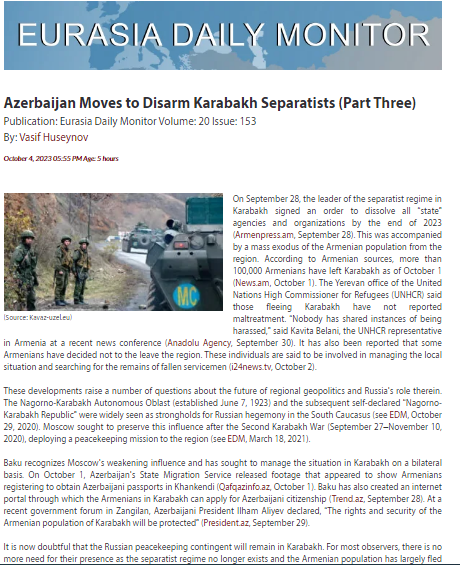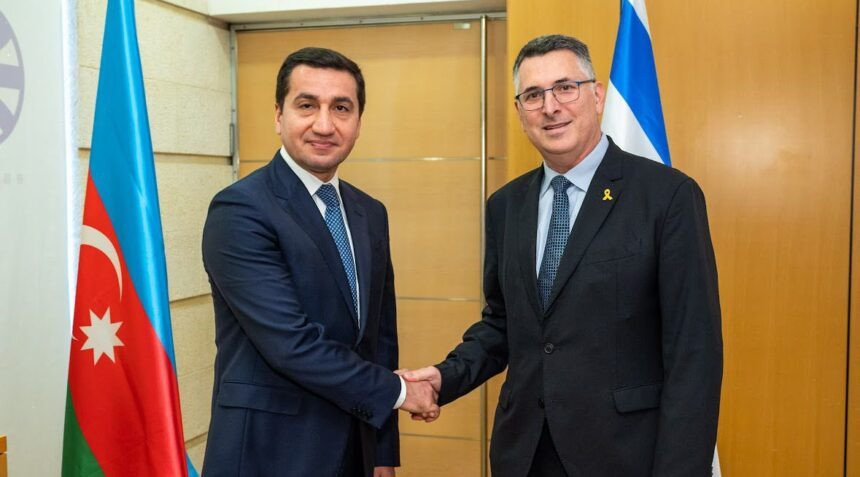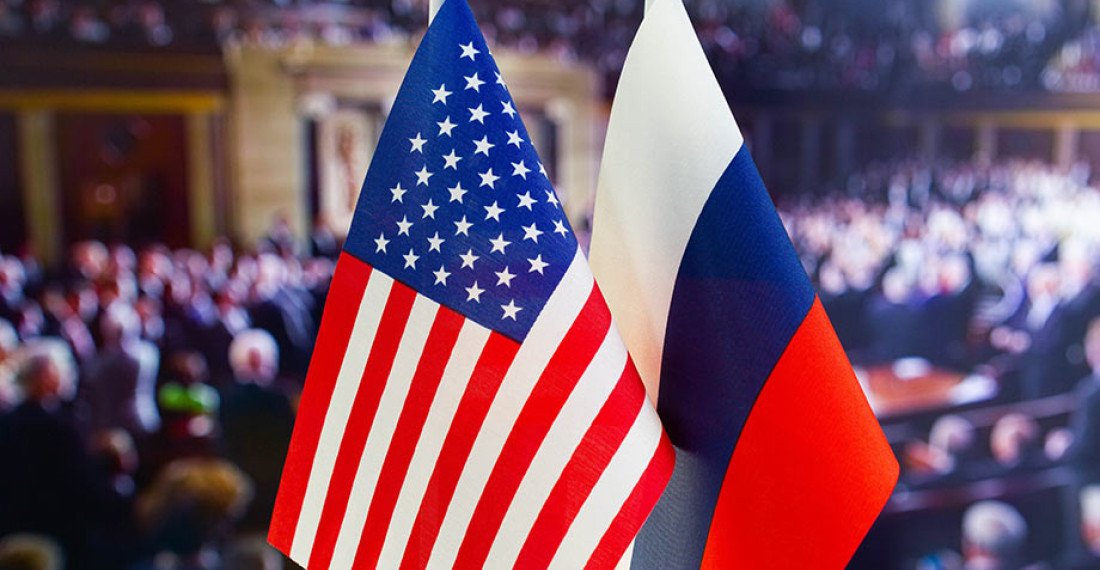On September 28, the leader of the separatist regime in Karabakh signed an order to dissolve all “state” agencies and organizations by the end of 2023 (Armenpress.am, September 28). This was accompanied by a mass exodus of the Armenian population from the region. According to Armenian sources, more than 100,000 Armenians have left Karabakh as of October 1 (News.am, October 1). The Yerevan office of the United Nations High Commissioner for Refugees (UNHCR) said those fleeing Karabakh have not reported maltreatment. “Nobody has shared instances of being harassed,” said Kavita Belani, the UNHCR representative in Armenia at a recent news conference (Anadolu Agency, September 30). It has also been reported that some Armenians have decided not to the leave the region. These individuals are said to be involved in managing the local situation and searching for the remains of fallen servicemen (i24news.tv, October 2).
These developments raise a number of questions about the future of regional geopolitics and Russia’s role therein. The Nagorno-Karabakh Autonomous Oblast (established June 7, 1923) and the subsequent self-declared “Nagorno-Karabakh Republic” were widely seen as strongholds for Russian hegemony in the South Caucasus (see EDM, October 29, 2020). Moscow sought to preserve this influence after the Second Karabakh War (September 27–November 10, 2020), deploying a peacekeeping mission to the region (see EDM, March 18, 2021).
Baku recognizes Moscow’s weakening influence and has sought to manage the situation in Karabakh on a bilateral basis. On October 1, Azerbaijan’s State Migration Service released footage that appeared to show Armenians registering to obtain Azerbaijani passports in Khankendi (Qafqazinfo.az, October 1). Baku has also created an internet portal through which the Armenians in Karabakh can apply for Azerbaijani citizenship (Trend.az, September 28). At a recent government forum in Zangilan, Azerbaijani President Ilham Aliyev declared, “The rights and security of the Armenian population of Karabakh will be protected” (President.az, September 29).
It is now doubtful that the Russian peacekeeping contingent will remain in Karabakh. For most observers, there is no more need for their presence as the separatist regime no longer exists and the Armenian population has largely fled the area. According to Russian presidential spokesman Dmitry Peskov, Moscow will discuss the future of the mission with Baku (Kommersant, September 29). Azerbaijan was never happy with the work of the Russian mission and consistently criticized its failure to ensure regional stability and denounced the military support it provided to the separatist regime (see EDM, September 22, 2021, March 29, 2022).
Given these circumstances, some observers expected that Azerbaijan’s military operation in Karabakh might lead to a collision with Russia troops. On September 20, the two sides came close to such a clash when the Azerbaijani military opened fire on a car full of Russian peacekeepers in the Tartar region (Sputnik.az, September 21). Baku moved quick to calm tensions. In a phone conversation with Russian President Vladimir Putin, Aliyev apologized and offered his condolences for the tragedy. He also expressed Azerbaijan’s readiness to provide financial assistance to the families of those peacekeepers who were killed (President.az, September 21).
While tensions have not escalated further between Azerbaijan and Russia, Yerevan and Moscow’s relationship has steadily deteriorated. On September 25, the Russian Foreign Ministry released a statement advising Armenian Prime Minister Nikol Pashinyan against making a “huge mistake” by becoming a part of the West’s geopolitical games. In particular, the Russians blame Pashinyan for the present situation in Karabakh: “Instead of adhering to the gentlemen’s agreement reached by the leaders of Russia, Azerbaijan, and Armenia in November 2020 to leave the issue of Nagorno-Karabakh’s status to future generations, Nikol Pashinyan succumbed to Western influence” (Mid.ru, September 25).
The Armenian government is concerned that Moscow seeks to force a regime change in Yerevan (Armenpress.am, September 21). Some officials believe that Russia deliberately tried to drag Armenia into the fighting in Karabakh on September 19 and 20 with the purpose of destabilizing the country. “Since this scenario did not work out, now they are already trying to achieve their goal on the streets. They are trying to change the government in Armenia,” said Armen Grigoryan, secretary of the Armenian Security Council, in an interview with local media (News.am, September 21). Grigoryan’s statement came amid ongoing protests in Yerevan demanding Pahunyan’s resignation over his mishandling of the situation in Karabakh (News.am, September 22).
These simmering tensions have been further enflamed by public criticism from officials on both sides. Dmitry Medvedev, deputy chairman of the Russian Security Council, criticized Pashinyan for his engagement with the North Atlantic Treaty Organization and concluded with the suggestive phrase “imagine what awaits him” (Aysor.am, September 19). In alluding to Russia’s role in the anti-government protests, the Armenian premier criticized Moscow’s alleged intervention: “Some of our partners are making more and more efforts to expose our security vulnerabilities, now putting not only our external but also internal security and stability at risk, violating the ethics of diplomatic, interstate relations in the process” (Azatutyun.am, September 24).
The disbandment of the separatist regime in Karabakh has effectively put an end to the decades-long conflict between Armenia and Azerbaijan over the region. This, in turn, has opened up new opportunities for re-engaging in peace talks. The overall security situation in the South Caucasus, however, remains uncertain, particularly due to the growing friction between Yerevan and Moscow.
https://jamestown.org/program/azerbaijan-moves-to-disarm-karabakh-separatists-part-three/








